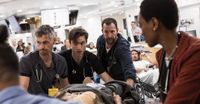In the world of medical dramas, accurate portrayal of emergency situations can often be overshadowed by dramatic, cinematic liberties that stray far from reality. One glaring example is the use of defibrillators. Many are familiar with the intense scenes in movies that depict patients flatlining, only to be jolted back to life with a defibrillator. However, this depiction is misleading, as defibrillators are designed to restore a normal rhythm to a heart that is beating chaotically rather than reviving a heart that has stopped altogether.
This misconception was addressed by Yara Basta, an emergency room doctor at the Flevoziekenhuis in Almere. In a recent discussion around the TV show The Pitt, she expressed relief that this well-known cinematic trope of reviving a flatlining patient is absent in the series. “The Pitt is the best and most realistic hospital series I know,” Basta said, emphasizing the authentic decision-making challenges faced by the show's protagonist, Dr. Robby. The series, which is currently airing on HBO Max, follows the hectic life of medical staff in a fictional Pittsburgh emergency room, offering a glimpse into the pressures of their daily routines.
Apart from The Pitt, other medical series such as Berlin ER and the upcoming Pulse on Amazon Prime Video are gaining viewership. Riemke Mars, a medical intern at UMC Groningen, suggested The Resident as a notable series that fosters teamwork within a hospital setting. “There, there is a strong emphasis on team-based care,” she explained. Like Basta, she too noted a past enjoyment of shows like Grey’s Anatomy, but voiced concerns over its unrealistic portrayal of doctors' extensive competencies. “In the show, doctors seem to be anesthetists, surgeons, and emergency room physicians all at once, neglecting the teamwork aspect that is crucial in real life,” Mars said.
Reflecting on their viewing experience, both Basta and Mars shared their feelings about the realism in today’s medical dramas. For instance, Mars mentioned her enjoyment of The Resident not only for its medical accuracy but also for its engaging portrayals of interpersonal relationships within hospital teams. “The nice interactions among the characters are commendable; many medical dramas highlight troubled doctors, often at the expense of team dynamics,” she added.
Contrastingly, David Baden, an emergency room physician at Diakonessenhuis in Utrecht, expressed a preference for the comedy Scrubs. He appreciates its humor but notes that it captures deeper emotional experiences, such as the pressures medical professionals face. “Scrubs conveys the absurdity of situations in a medical setting while authentically reflecting the emotional burden on physicians,” he explained. Meanwhile, he finds the heavy cynicism portrayed in series like The Pitt to be excessive, stating that “almost everyone appears deeply depressed or suffers from post-traumatic stress in these early episodes.”
Baden also addressed the classic medical drama House. While it featured a brilliant but misanthropic lead character, he noted a disconnection from the practical realities of medical diagnostics. “The conditions are often real, but House’s methods are utterly illogical. For example, he draws blood and makes a diagnosis based on that, leading to multiple incorrect assumptions and repeats,” he noted. These dramatic inaccuracies can lead to misleading impressions about medical practice in real life.
While enjoying various styles of medical dramas, viewers like Basta, Mars, and Baden would like to see an exploration of the human aspects of medicine that often miss in mainstream television. Mart opined that drama should shed light on the pressures faced by medical staff in busy emergency rooms and the unpredictability of outcomes in medical treatment. Details such as the effects of large patient volumes on clinician decision-making add another layer to the portrayal of healthcare that many series neglect.
Mars reinforces this by noting that the narrative often suggests that doctors will invariably find answers to every medical predicament. “Many shows give the impression that with enough effort, all mysteries can be unraveled. This simply isn’t realistic,” she commented.
In summary, while medical series like The Pitt, The Resident, and even classics like Scrubs provide entertainment, they also spark critical conversations about the depiction of healthcare in media. Real-world applications of medicine often offer challenges and emotional experiences that deserve honesty and accuracy in representation. As emergency physicians reflect on both current and past series, they recognize an ongoing need to portray the complexity, teamwork, and humanity that define medical profession.





